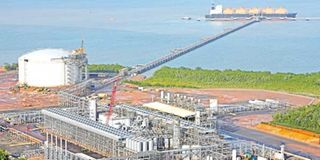Renewed hope for liquefied natural gas project

Dar es Salaam. Tanzania has natural gas of the highest quality, according to energy giant Shell.
Shell Tanzania said in a statement yesterday that Tanzania had natural gas with the lowest carbon intensity in the firm’s entire portfolio.
This has raised hope that the envisaged liquefied natural gas (LNG) plant in the south of the country will eventually become a reality.
Shell’s statement comes at a time of concerns that delayed negotiations between the government and multinationals on the project put Tanzania at a disadvantage compared to neighbouring Mozambique, where over 180 trillion cubic feet (tcf) of natural gas reserves have been discovered. Tanzania, on the other hand, has 57tcf of proven reserves.
Parliament’s Budget Committee said last year that delays in LNG negotiations had prompted some players to scale down their exploratory activities and concentrate on operations in other countries.
ExxonMobil announced last year that it was seeking buyers for its stake in a large undeveloped gas field off Tanzania so that it could focus on the development of a bigger project in Mozambique.
But Energy minister Medard Kalemani told the House that construction of the LNG facility would start in 2022, adding that negotiations with multinationals interested in the project were in progress.
Shell said the quality of Tanzania’s gas meant that the LNG plant would be notable for its significantly lower carbon footprint.
“With lessons from Shell’s most recent LNG project in Canada – which has many similarities to the Tanzania project – that took final investment decision (FID) in 2018, the project in Tanzania will use technology that increases efficiency and reduces carbon emissions,” the statement said.
Shell has invested over $2 billion in Tanzania during the past decade, the statement added, quoting the firm’s lead economist, Mr Beatus Rwechungura.
“Natural gas discovered in Tanzania is a very high-quality resource that has the lowest carbon intensity in the whole Shell portfolio. With today’s climate change challenges, this is a very important criterion for LNG development efficiency. This is what makes Tanzania LNG unique and this is what makes it an important asset for Shell,” Mr Rwechungura said.
Shell, along with Ophir Energy and Pavilion Energy, operates blocks 1 and 4 and has had successful drilling campaigns in Tanzania.
Twenty-two exploration and appraisal wells have been drilled.
In Mozambique, US-based Anadarko Petroleum last month approved a $25 billion LNG project which is expected to transform the southern African country’s economy.
Besides, an Exxon-led project known as Rovuma LNG, seeks to produce 15.2 million tonnes annually at a facility adjacent to Anadarko’s. The final investment decision is expected by the end of the year.
Eni, an Italian multinational oil and gas firm, approved another $7 billion project in 2017.
Wood Mackenzie, an international company specialising in research and consultancy, predicts that the global natural gas market will expand significantly from 2023.




